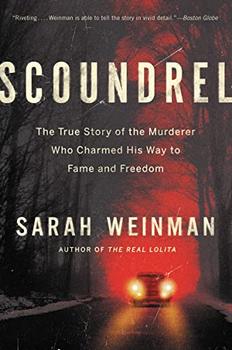Summary | Excerpt | Reviews | Beyond the book | Read-Alikes | Genres & Themes | Author Bio

How a Convicted Murderer Persuaded the Women Who Loved Him, the Conservative Establishment, and the Courts to Set Him Free
by Sarah Weinman"There is certainly a book in the weird coming together of three people as different as the three of us, for a psychologist at least."
So were the reflections of book editor and translator Sophie Wilkins in July 1998, 30 years after her epistolary introduction to Edgar Smith, a man accused of murdering a 15-year-old girl in 1957 — and at one time, the longest-serving death row inmate in America. Wilkins was writing to none other than William F. Buckley Jr., the founder of the conservative magazine the National Review, who was famous for — among other forays into the political arena — calling Gore Vidal a homophobic slur on live television during the 1968 Democratic National Convention. It was, as Wilkins alluded to, quite the unexpected group of compatriots, brought together by an even more unexpected cause.
Despite overwhelming evidence against him — meticulously compiled by Sarah Weinman in Scoundrel — Smith continued to advocate for himself throughout his 14 years on death row. He was helped by Buckley and Wilkins; the letter quoted above is just one of many exchanges between the two on the "outside." They both were convinced of Smith's innocence by the manipulative killer himself and spent large amounts of time and money on attempts to free him. In her book, Weinman provides biographical portraits of these three figures, as well as others swept up in Smith's web of lies. By humanizing those often seen as collateral damage in legal or crime dramas, Weinman gives a personal look at the repercussions of crime, incarceration and manipulation at the highest level.
I was immediately hooked by the strangeness of the situation in which Wilkins and Buckley found themselves as two corners of this odd triangle they formed with Smith. Buckley's money and fame gave Smith opportunities to find an audience for his writing from inside "The Death House" — the prison in Trenton, New Jersey in which he was incarcerated. After successfully publishing some articles and self-interviews, Smith met Wilkins (through Buckley), and she walked him through the publication of his bestselling nonfiction book Brief Against Death. She is one of the clearest examples of Smith's penchant for manipulating the women in his life; Weinman includes excerpts of letters between Wilkins and Smith, which ran the gamut from professional to friendly to erotic. By the time Wilkins wrote the letter to Buckley mentioned above, she had cut off contact from Smith after realizing that he had manipulated her into an emotional affair. The inclusion of this relationship and the author's deep dive into it provides a tangible example of the lengths Smith went to in order to control women, even from deep inside prison walls.
It is difficult to articulate this book's importance to our current times in better words than Weinman herself uses in the introduction:
"When police brutality and mass incarceration are perennially under a national microscope, when the lives of countless Black and Brown boys and men are permanently altered by the criminal justice system, the transformation of Edgar Smith into a national cause more than half a century ago raises uncomfortable questions about who merits such a spotlight and who does not."
Inferring from the quotes and biographical information included in the text, it is difficult to imagine the conservative leader Buckley taking a stand for the death row inmate had he been a person of color. Weinman also raises questions of systemic sexism and misogyny. The true crime genre — and the world itself — is full of stories of criminals whose heinous acts are exacerbated by their manipulation of those around them. In this case, the male criminal used and abused women to the point of sexual assault, attempted murder and homicide, yet stories surrounding his strange life and connections have revolved around him and him alone, rather than giving a voice to his many victims.
Of course, it is impossible to give a voice back to his first victim, whose life he stole over six decades ago. But through the tireless work of Sarah Weinman, Scoundrel begins to resolve some of the issues that occur when those who inflict harm are given more attention than those they target. Rather than exploit the suffering of the women hurt by Smith (both of his wives, his mother, the woman he killed, the woman he tried to kill, the girlfriends sprinkled throughout his time in prison), Weinman delicately and deftly elevates their stories with a respect and care that is inspiring to see.
![]() This review was originally published in The BookBrowse Review in April 2022, and has been updated for the
February 2023 edition.
Click here to go to this issue.
This review was originally published in The BookBrowse Review in April 2022, and has been updated for the
February 2023 edition.
Click here to go to this issue.

If you liked Scoundrel, try these:

by Caroline Fraser
Published 2025
From the Pulitzer Prize–winning author of Prairie Fires comes a terrifying true-crime history of serial killers in the Pacific Northwest and beyond—a gripping investigation of how a new strain of psychopath emerged out of a toxic landscape of deadly industrial violence.

by Candace Fleming
Published 2025
How did Jim Jones, the leader of Peoples Temple, convince more than 900 of his followers to commit "revolutionary suicide" by drinking cyanide-laced punch? From a master of narrative nonfiction comes a chilling chronicle of one of the most notorious cults in American history.
Your guide toexceptional books
BookBrowse seeks out and recommends the best in contemporary fiction and nonfiction—books that not only engage and entertain but also deepen our understanding of ourselves and the world around us.